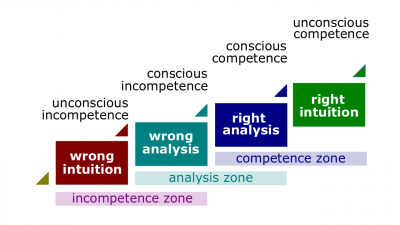Difference between revisions of "Structured-task competence"
m (Gary moved page Hierarchy of structured-task competence to Structured-task competence) |
|||
| Line 1: | Line 1: | ||
| − | [[File:Competence-levels.png|400px|thumb|right|[[ | + | [[File:Competence-levels.png|400px|thumb|right|[[Structured-task competence]]]][[Structured-task competence]] (hereinafter, the ''Competence'') is one's [[competence]] in performing some [[structured task]], as well as a hierarchy of various levels of the ''Competence'' and a [[learning model]] that suggests how this hierarchy can be developed. As a hierarchy and.or [[model]], the ''Competence'' is alternatively called [[hierarchy of structured-task competence]], [[competence learning model]], [[four stages of competence]], or, simply, [[hierarchy of competence]] and describes psychological states involved in the process of progressing from incompetence to analytical competence and, further, to intuitive competence in some knowledge, skill, and/or ability. |
| + | |||
==Stages== | ==Stages== | ||
Revision as of 17:26, 17 December 2019
Structured-task competence (hereinafter, the Competence) is one's competence in performing some structured task, as well as a hierarchy of various levels of the Competence and a learning model that suggests how this hierarchy can be developed. As a hierarchy and.or model, the Competence is alternatively called hierarchy of structured-task competence, competence learning model, four stages of competence, or, simply, hierarchy of competence and describes psychological states involved in the process of progressing from incompetence to analytical competence and, further, to intuitive competence in some knowledge, skill, and/or ability.
Stages
- Unconscious incompetence (or wrong intuition). A situation in which the individual neither understands nor knows how to accomplish a task and does not necessarily recognize the deficit.
- Conscious incompetence (or wrong analysis). A situation in which the individual neither understands or knows how to accomplish a task, but he or she recognizes the deficit. He or she also realizes the value of new knowledge, skill, and/or ability needed in addressing the deficit. The making of mistakes can be integral to the learning process at this level of competence.
- Conscious competence (or right analysis). A situation in which the individual understands and/or knows how to accomplish a task. However, demonstrating the knowledge, skill, and/or ability requires concentration. It may be broken down into steps, and there is heavy conscious involvement in executing the needed knowledge, skill, and/or ability.
- Unconscious competence (or right intuition). A situation in which the individual not only understands and knows how to accomplish a task, but has had so much practice with a skill that it has become "second nature" and can be performed easily. As a result, the skill can sometimes be performed while executing another task. The individual may be able to teach it to others, depending upon how and when it was learned.
